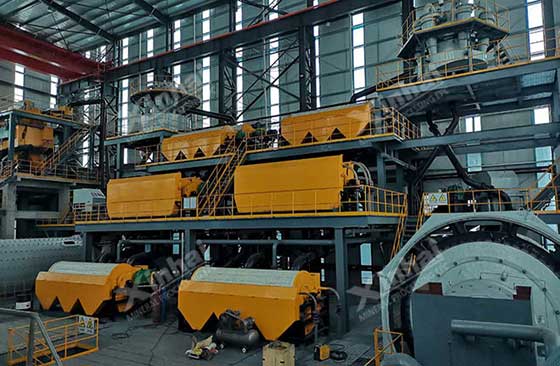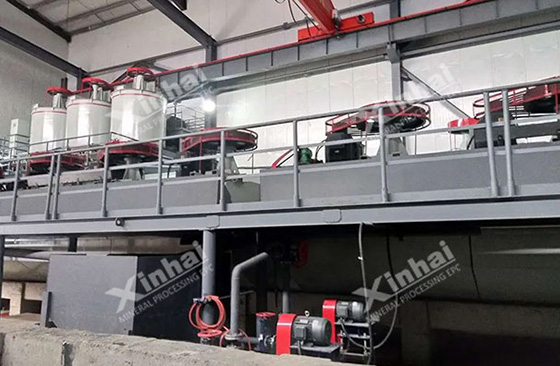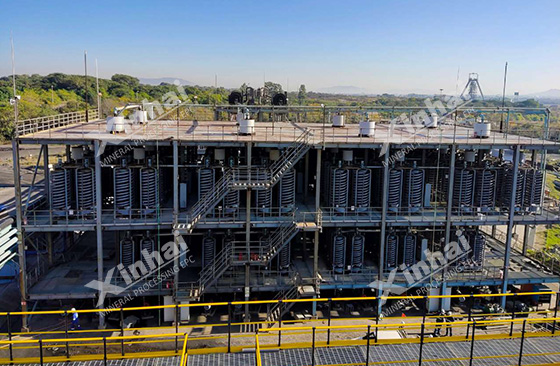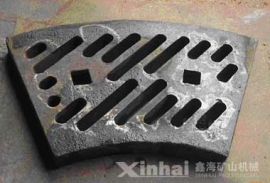In view of the current development and utilization of complex and difficult-to-separate magnetite ore resources, selecting appropriate mineral processing equipment and appropriately improving the beneficiation process are important ways to improve the efficiency of iron ore beneficiation. Magnetite ore separation equipment is classified based on the main separation force field combination method, and can be divided into single separation equipment such as magnetic separation, gravity separation, and flotation, and joint separation equipment composed of the above single separation processes.

At present, the widely used stage grinding-weak magnetic separation process, weak magnetic field multi-stage magnetic separation process, and on this basis, fine screen regrinding, magnetic-gravity combined separation, magnetic-flotation combined separation and reverse flotation separation are added. The following will introduce you to magnetite ore single beneficiation equipment, such as gravity separation, magnetic separation and flotation, etc., to help you better understand the magnetite ore beneficiation process.
Use the table of contents below to navigate through the guide:
01Magnetite ore magnetic separation equipment
The method of separating useful minerals and gangue minerals based on their magnetic properties is called magnetic separation. The commonly used magnetic separation equipment for magnetite ore is a wet cylindrical weak magnetic field magnetic separator. With the continuous development and progress of technology and materials, some new weak magnetic separators such as external magnetic drum magnetic separator and dynamic magnetic field dry separator are gradually used in the magnetite beneficiation process. Among them, high gradient magnetic separator and superconducting magnetic separator are called the mainstream equipment. Research on magnetic separators focuses on improving separation accuracy, increasing processing capabilities and adopting advanced technologies. As the overall social awareness of environmental protection increases, the development of magnetic separators focuses on economic and energy conservation and reducing the generation of pollutants.

02Magnetite ore flotation equipment
According to the different physical and chemical properties of the surface of mineral particles, the method of sorting minerals according to their flotability differences is called flotation. Common flotation equipment is mainly divided into two categories: flotation machine and flotation column. Flotation equipment is mainly used in the reverse flotation process of magnetite. With its advantage of large processing capacity, it realizes the roughing, selection, and sweeping processes of fine-grained minerals to obtain qualified concentrates. The multi-stage flotation system composed of flotation machines has a long process and a large area, and the flotation effect for fine-grained minerals is average. The flotation system composed of flotation columns can improve the quality of the concentrate, but at the same time, the loss of tailings is also large.

03Magnetite ore gravity separation equipment
The density, particle size, and shape of the phases between mineral particles are different. The method of mineral separation based on the different movement rates and directions of these minerals in the medium is called gravity separation. Common gravity separation equipment includes jigs, shakers, spiral chutes, etc. The gravity separation process can produce concentrate, sub-concentrate, medium concentrate and tailings at one time. However, fine sludge is not easy to settle during gravity separation and is easily lost in the tailings. In addition, it is difficult to effectively separate fine-grained minerals in the gravity separation process. In order to improve the sorting effect, a centrifugal force field, such as a spiral chute, is added to the sorting process. From the perspective of separation effect, although the traditional gravity separation method can obtain higher concentrate indicators, it suffers a greater loss of fine-grained minerals and cannot be well adapted to large-scale iron ore separation.

A large amount of practical experience and research have shown that magnetite gravity separation has the advantages of low energy consumption, no pollution, and large processing capacity, but it also has disadvantages such as coarser particle size and low sorting effect. Although the magnetite flotation process has the advantage of a low lower limit, the flotation chemical system is complex, the chemical consumption is large, and the cost is high, making it difficult to meet the increasing environmental protection requirements. The magnetite magnetic separation process is specific to magnetic minerals, and magnetic inclusions can easily lead to low grade magnetic concentrate. Therefore, when dealing with refractory minerals, it is difficult to use magnetic separation equipment, gravity separation equipment or flotation equipment alone to show consistent advantages in terms of processing capacity, selectivity and adaptability to particle sizes. Therefore, it is necessary to combine centralized mineral processing methods for processing, so as to make full use of mineral resources, improve the taste of concentrates and the utilization rate of tailings.


 marketing@ytxinhai.com
marketing@ytxinhai.com  0086 13810327080
0086 13810327080 






































































































 CHAT
CHAT MESSAGE
MESSAGE




